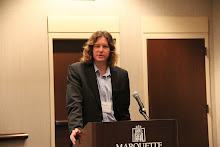In Richard Capobianco's new book Engaging Heidegger he offers us a new translation of a letter Heidegger sent six weeks before his death to the tenth meeting of the Heidegger Circle in the US. I find the letter, and the suggestion he makes for the direction in which those who follow his work might steer their research, particularly striking and so will share some key bits here:
"Thinking people greet one another by posing to each other questions... From the variety of questions that are necessary here, the following one may be stated:
Is modern natural science - as it is maintained - the foundation of modern technology or is it itself already the basic form of technological thinking, the determining fore-conception of technological representing and its constant intrusiveness in the implementing and establishing machination of modern technicity?
...In the few days of the Colloquium, you will not be able to answer, nor probably even to be able to pose adequately, this question concerning the relation of the modern natural sciences to modern technicity.
But it would be already sufficient and beneficial if each of the participants gave attention, each in his own way, to this question and took it up as a suggestion for his area of research."
Heidegger's closing suggestion to America's Heideggerians of 1976 is, then, that they each in their own way address the question of the possible connection between modern science generally and the distortive and dominating enframing which is found in purely calculative technological thought. This same suggestion had already been made in "The Question Concerning Technology", specifically that modern science is technological before it gives rise to the development of modern technology, but that not only enframing but the relationship between scientific thought and enframing was still this important to Heidegger at the very end is particularly interesting.
Subscribe to:
Post Comments (Atom)


one possible line of such thought as taken by Michel Henry which you might find useful to investigate is outlined in his book La barbarie. A sample of his approach can be found in his essay What Science Doesn't Know, my translation of which is available here.
ReplyDelete